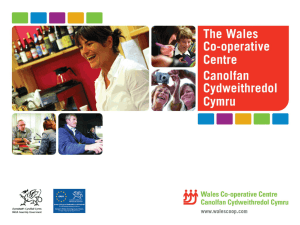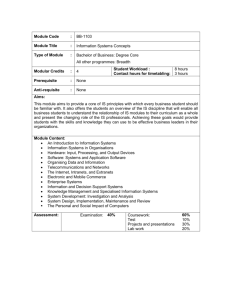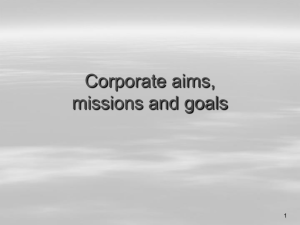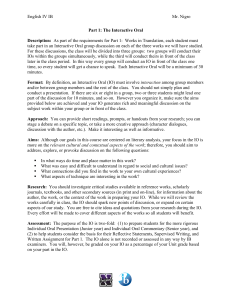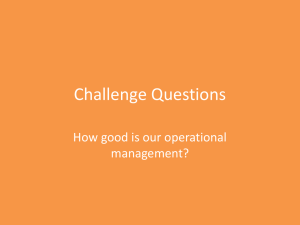Challenge Questions How good is our strategic leadership?
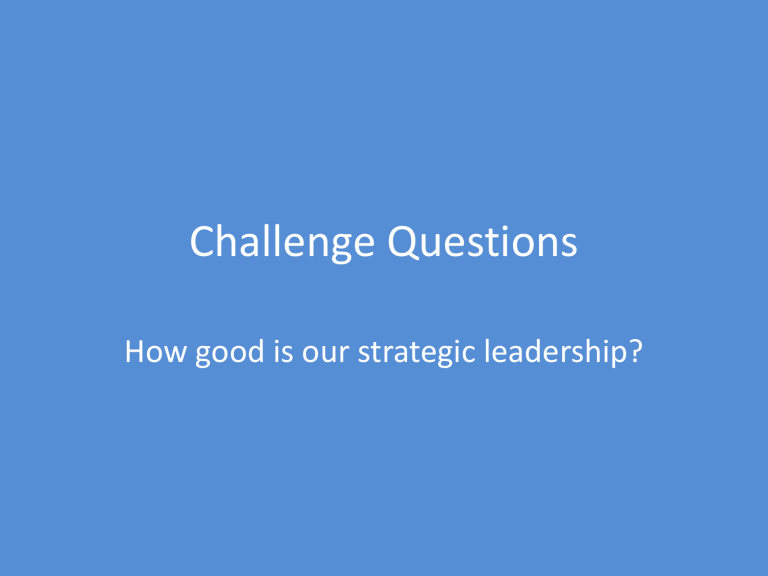
Challenge Questions
How good is our strategic leadership?
QI 9.1 Vision, values and aims
• What are our vision, values and aims? Do we have clear ones for both the organisation and any partnership we work in? Are our vision, values and aims consistent with local and national priorities?
• How ambitious and challenging are our vision, values and aims? How well do our vision, values and aims meet changing and emerging needs? Do they support us to retain clear purpose but be flexible, creative and innovative in our practice? Do they support improvement and excellence?
• How empowered are volunteers and staff to contribute to and work towards our vision, values, aims? How well do we support stakeholders, including those we work with, to understand and contribute to our vision, values and aims?
• How well do we work with partners to develop and work towards meeting joint visions, values and aims? How do we know?
• How well do our vision, values and aims promote economic, social and cultural diversity? Do they support us to meet the needs of all potential stakeholders? How well do they contribute to positive developments in equality of access and opportunity?
How do we know?
• How well do our vision, values and aims aim to challenge prejudice and eradicate discrimination? How well do they foster good relations? How do we know?
• How well are we meeting our vision, values and aims? How do we know? How well do we communicate progress and change to our stakeholders?
QI 9.2 The role of trustees, board, management committees
• As board members how well do we represent the community and stakeholders the organisation serves? How diverse are we? Do we represent a cross section of the community? How well do we ensure stakeholder voices are heard?
• Do we have the right mix of skills, knowledge and expertise? Do we learn from practice of boards elsewhere and share our practice with others?
• Do we have clear roles which are distinct from the role of staff and volunteers? Are these roles mutually understood and respected?
• How well do we provide appropriate governance, or where relevant leadership, to support the vision, values and aims of the organisation? How do we know?
• How well do we understand the outcomes the organisation is trying to achieve? How well do we support the organisation to improve its impact? How well do we support the organisation to anticipate and plan for change?
• How well do we monitor the organisation’s performance and management of risks?
How well do we understand and respond to financial, legal and other information presented by staff and/or volunteers?
• Are we clear how well the organisation meets legislation, regulation and codes of practice and how well is works to policies and guidance? How do we know?
QI 9.3 Leading people and developing partnerships
• To what extent does our leadership support a shared ethos of quality improvement and staff and volunteer empowerment?
• To what extent are staff, volunteers and any organisations we support empowered to take appropriate leadership in their own areas of work? How well do we develop the leadership capacities of staff and volunteers at all levels?
• How do we ensure that relationships with staff, volunteers and partners are characterised by trust?
• How do we ensure that the enthusiasm and commitment of staff, volunteers and key partners is mobilised and focused on securing improved impacts on the people and communities we work with? How do we know?
• To what extent does our ethos promote teamwork across the organisation and with other partners and stakeholders?
QI 9.4 Securing improvement of quality and impact of services
• How effective are our mechanisms to evaluate information from the people we work with, communities and other stakeholders?
• How well do we evaluate the outcomes of planned activities? How do we know?
• How do we ensure that the feedback we obtain from participants and stakeholders gives us the information we need to improve?
• What improvements have resulted from reflective practice and self-evaluation?
• What improvements have resulted from planning?
• How do we ensure that stakeholders are kept fully informed about improvements?
• How well do we encourage organisations we support and partnerships we lead to evaluate for improvement?
